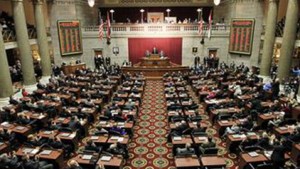 JEFFERSON CITY, Mo. – It was yet another busy week in the Missouri House of Representatives. The chamber was desperate to pass as much legislation as possible as the number of days left in the session dwindles down to single digits.
JEFFERSON CITY, Mo. – It was yet another busy week in the Missouri House of Representatives. The chamber was desperate to pass as much legislation as possible as the number of days left in the session dwindles down to single digits.
House Speaker Tim Jones suffered a hard loss on his education agenda as the House, for the second time, rejected a measure backed by Jones that would have implemented various changes to the evaluation of teachers and administrators. The vote took place late Wednesday night, and Jones was visibly frustrated by the end when SB 125 lost by six votes.
—
Here are some highlights from this week in the House:
HCR 17: A concurrent resolution urging the federal government to continue reimburse the state for medical care expenses through DSH payments moved through the House early in the week. While concurrent resolutions make no new law, they are largely symbolic. Republicans used the floor debate on the measure to slam President Barack Obama as well as other Democrats for the Affordable Care Act and the idea of Medicaid expansion.
HB 34: A lengthy floor debate was had over this bill, which will be sent to the desk of Gov. Jay Nixon. HB 34 would repeal a number of provisions regarding prevailing wage law, and aims to rewrite the way the Department of Labor and Industrial Relations determines the prevailing hourly wage rate for public works projects. The bill would likely reduce the overall prevailing wage rates of the state and allow local municipalities to determine what they will pay workers on public works construction projects. Republicans said it would save businesses money and enhance the quality of work while Democrats say the bill will allow out-of-state companies to undercut Missouri workers.
SB 90: This elections omnibus bill took plenty of time on the floor and has a wide range of impacts. Now set to enter a conference committee, the bill would allow certain municipal elected officials to serve longer terms and eliminate primary elections for local races. Current law allows for recounts when the margin of victory is less than 1 percent. This bill would change the amount to less than one half of 1 percent. The bill also has language changing the calculation of absentee ballots, requirements for electronic voting procedures and the use of election judges. Democrats and Republicans both attempted to amend the bill on the floor to insert election language, and the bill is expected to move through conference in time for both bodies to send it to the governor.
Budget: The House successfully adopted the 13 appropriations bills that compromise the state budget for the coming fiscal year. Led by House Budget Chairman Rick Stream, R-Kirkwood, the House spent several hours on Thursday morning and afternoon working through the bills, some of which passed with no opposition and some of which took significant time for debate. Appropriations for Primary and Secondary Education as well as higher Education were debated at length on the House floor. Both the House and Senate struck a hurdle when looking to appropriate funds for primary and secondary education in House Bill 2. The bill had a large fund for First Start which was contingent on the elimination of a tax credit for low-income seniors, which is opposed by Nixon. Some Democrats on the floor contended that it was in violation of House rules to include contingent funds in the budget.
Collin Reischman was the Managing Editor for The Missouri Times, and a graduate of Webster University with a Bachelor of Arts in Journalism.




